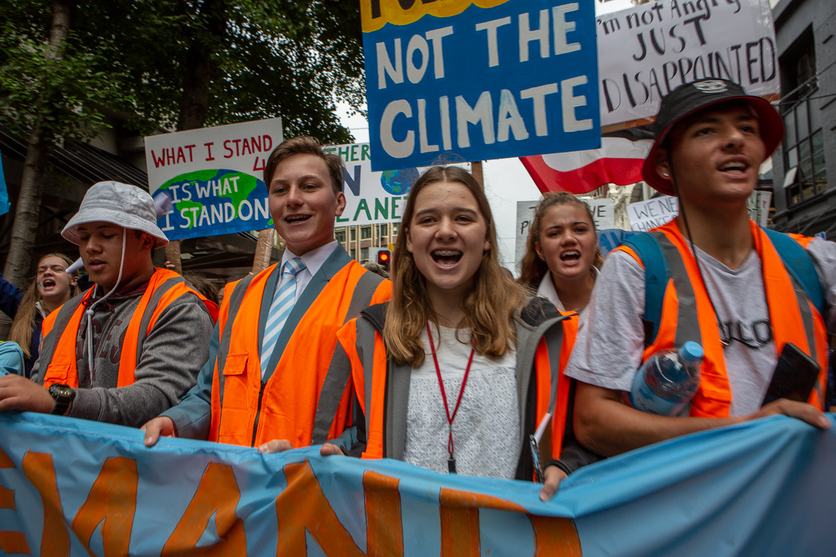Young people are facing a future of complex environmental challenges. How can we prepare them to save the world when the older generations haven’t?
Young people need to be equipped to deal with the future they’ll be living and working in. This means they need to understand the multiple colliding crises generated from human impacts on Earth systems, and they need to have the dispositions and skills to make responsible decisions and actions in response to these crises.
This need was picked up by the Organisation for Economic Co-operation and Development (OECD), which administers the Programme for International Student Assessment (PISA) every 4 years. The assessment measures the ability of 15-year-olds to use their reading, mathematics and science knowledge and skills to meet real-life challenges. When planning the PISA 2025 Science Framework, the OECD identified the need for a stronger environmental education focus.
We’re looking to create citizens who can understand science, use science and actually create a better world for us.
Associate Professor Chris Eames, University of Waikato
The Environmental Science Expert Working Group was established to prepare a supplementary document to the science framework.
The report
The report, Agency in the Anthropocene, draws on research to identify core competencies our students will need for the future. These are the three core competencies at the heart of the report:
- Being able to explain that the impacts of humans on Earth’s systems and understand that humans are part of the ecosystem as opposed to being separate from it.
- Making informed decisions to act, based on evaluation of diverse sources of evidence and the application of creative and systems thinking to regenerate and sustain the environment.
- Demonstrating hope for the future and respect for diverse perspectives and different knowledge systems when seeking solutions to the socio-ecological crisis.
Utilising the report
We have to think carefully about whether we’re teaching about the impacts of climate change or whether we’re teaching about the understanding of how we have human-induced climate change and what we might do about it.
Associate Professor Peta White, Deakin University.
The second part of the report includes suggestions for implementation, including teaching and assessment of the outlined competencies. The five socio-ecological crises used are:
- climate change
- biodiversity loss
- water availability and quality
- energy supply
- waste management and pollution.
Recognising the challenge of standardised, written assessment, the report offers three examples of how such assessment might be achieved:
- Top predators: This demonstrates knowledge about food chains and webs and ecosystems as well as the societal impacts of the reintroduction of these species via stakeholder analysis.
- Should we eat meat?: Questions such as these (with provided data) enable assessment of ethical considerations as well as data analysis.
- Life cycle analysis: Exploring the concepts of waste and pollution, questions around the circular economy and life cycle analysis including knowledge about energy and matter.
Agency in the Anthropocene is available here. The PISA 2025 Science Framework is available here.
Activity ideas
Across the generations – and for young people in particular – climate change is recognised as the most important challenge that our world faces. Education is a critical agent in addressing this urgent issue. Learn more in the PLD article Climate change – classroom competencies.
Concept cartoons are a useful way to explore scientific thinking and to consider different perspectives on socio-scientific issues.
Climate change – challenging conversations is a student activity that uses concept cartoons to invite constructive and respectful classroom conversation.
Professional learning resources
The video in this article was one of a number of presentations from the 2024 national summit convened by the Science Learning Hub Pokapū Akoranga Pūtaiao and Royal Society Te Apārangi.
Associate Professor Chris Eames presented a series of professional learning development webinars on teaching and learning around climate change:
- Understanding the basics of climate change
- Exploring climate change education in secondary schools
- Exploring climate change education in primary schools
The Climate change resources – planning pathways interactive suggests ways in which climate change can be broken down into smaller, more manageable themes or investigations for the classroom.
In the recorded professional learning webinar Enduring competencies for designing science learning pathways, Dr Rosemary Hipkins discusses the concept of enduring competencies – competencies that focus on what students can do with their knowledge and understanding.
In What is a knowledge system?, educational experts Pauline Waiti and Dr Rosemary Hipkins explore the idea of knowledge systems with examples from science and mātauranga Māori. In the follow-up webinars, Learning benefits of a knowledge systems approach to science and Taking a knowledge systems approach in the classroom: Some dos and don’ts, they provide provocations about the purpose of Mana ōrite mō te mātauranga Māori and explore the learning benefits and examples of a knowledge systems approach to science.
In the video Don’t give up hope, educators and scientists speak about taking action in the local environment to make a difference, build connections and gain hope for the future.
Useful links
The authors of Agency in the Anthropocene utilised the Oxford University Press publication, The evolution of science education. The publication reports on the future of science education. It reflects on the impact of the COVID-19 pandemic and looks ahead to the PISA 2025 Science Framework.
The Stanford University publication Science education in an age of misinformation looks at the challenges science educators face and what can be done to help students develop competencies to evaluate scientific information.


